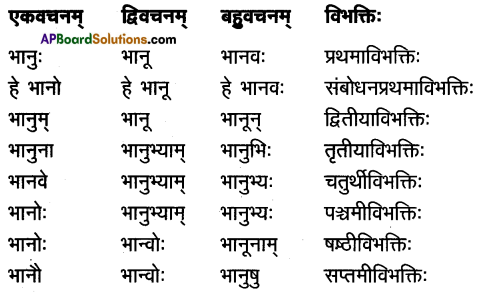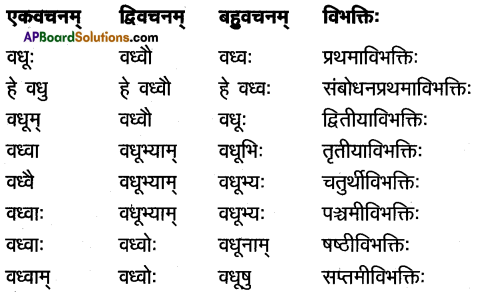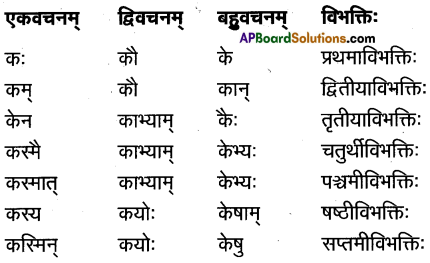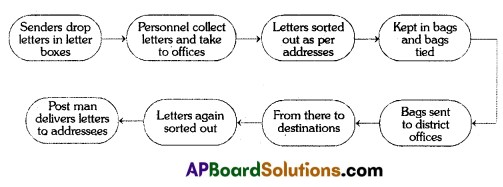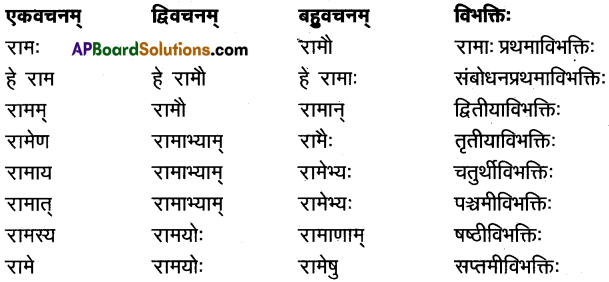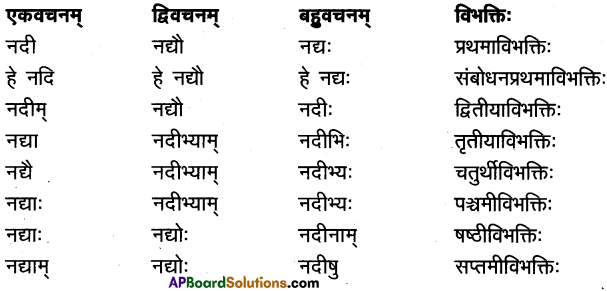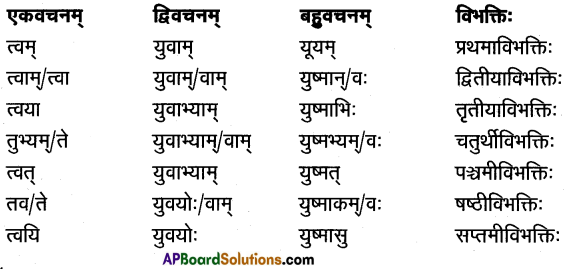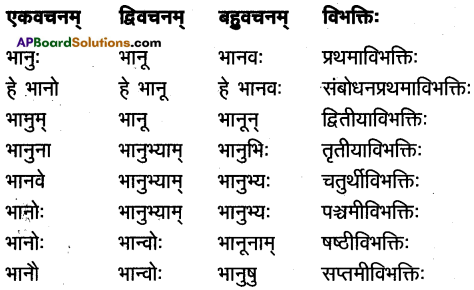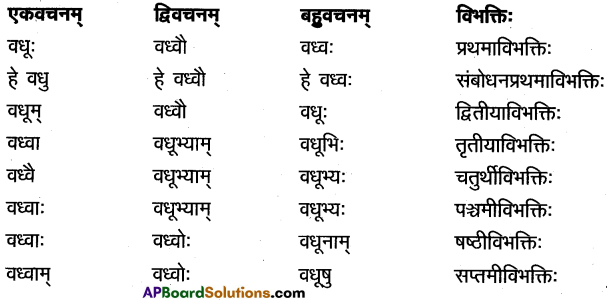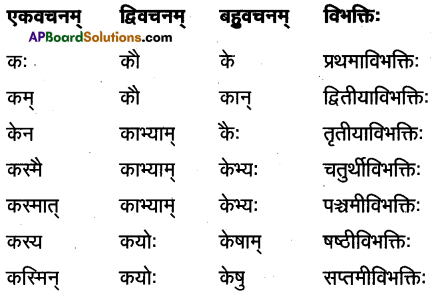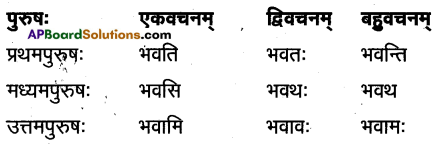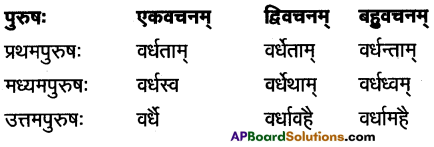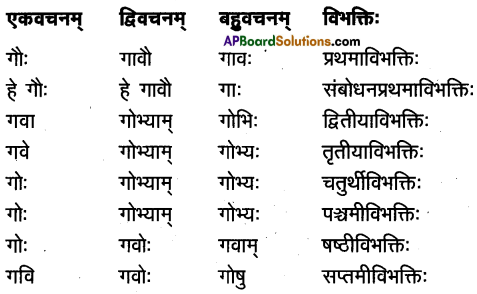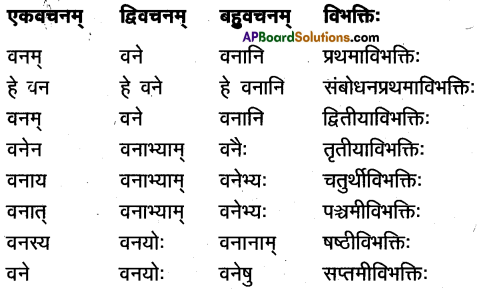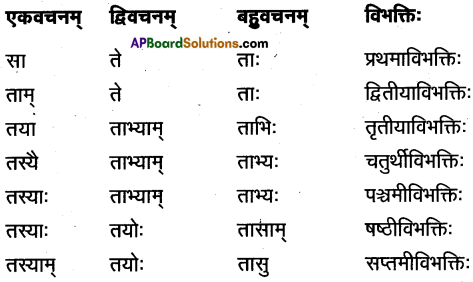Thoroughly reviewing AP Inter 1st Year English Model Papers Set 4 helps in understanding the examiner’s expectations.
AP Inter 1st Year English Model Paper Set 4 with Solutions
Time: 3 Hours
Max. Marks : 100
Section – A
I. Annotations (Prose)
(a) Mother India wants hard working good boys and good girls.
Answer:
Context : This passage is taken from the lesson “What makes a nation”. C. Rajagopala chari made an inspiring speech at the Nagpur Institute of Technology in the 1948. While giving suggestions1 to the students, he spoke about some of the important points to be noted by the students.
Explanation: Rajaji was very happy to listen2 to the speech delivered3 by a girl student. He said that the girl students were competing with the boys. The curve of success4 was in favour of the girls. The speaker wished that both girls and boys should maintain good character. Mother India has to develop through the efforts5 of good boys and good girls.
General Relevance: Rajagopalachari’s speech has got important advice to the youth. In this sentence he exhorts the students giving valuable suggestions.
1. సలహాలు
2. వినుట
3. ఇవ్వబడిన
4. విజయపు రేఖ
5. ప్రయత్నములు
సందర్భము : సి. రాజగోపాలాచారి రచించిన “What Makes a Nation” అనబడే పాఠం నుండి ఈ లైను తీసికొనబడినది. సి. రాజగోపాలాచారి చాలా భావస్ఫోరకమైన సంభాషణ చేశాడు. ఇది నాగపూరు Institute of Technology లో 1948లో ఇవ్వబడినది. ఆయన సలహాలనిస్తూ విద్యార్థులకు కొన్ని ముఖ్యమైన గమనింపదగిన మాటలు చెప్పారు.
వివరణ : ఒకానొక విద్యార్థిని చెప్పిన సంభాషణ వినడానికి రాజగోపాలచారి చాలా సంతోషంగా ఉండెను. ఆడపిల్లలు మగపిల్లలతో పోటీపడుతున్నారు. విజయరేఖ ఇప్పుడు విద్యార్థినులవైపుకు ఉంటున్నది. విద్యార్థులు మరియు విద్యార్థినులు మంచి ప్రవర్తన కలిగి ఉండాలి. మంచి బాలురు మరియు మంచి బాలికల ప్రయత్నములవలన భారతమాత అభివృద్ధి చెందాలి.
సాధారణ భావన : రాజగోపాలాచారిగారి సంభాషణ యుకతకు మంచి సలహాను కలిగి యున్నది. విలువైన సలహాలనిస్తూ, విద్యార్థులకు బోధిస్తున్నాడు.
(b) “Teach him to learn how to gracefully lose and enjoy winning when he does win”.
Answer:
Context: These lines are taken from the lessson “Abraham Lincoln’s Letter to his Son’s Teacher”, written by Abraham Lincoln, the noted 16th President of the U.S.A. It is about his appeal to the teacher, in instructing a boy of tender age.
Explanation: The author advises the teacher to be careful1 in his dealing with the boy. The boy should have development in all spheres of life. He should tackle wars, tragedy and sorrow. Victory2 and failures are natural in this world. The boy must have self confidence. He should not be disheartened when he loses. When he wins, he should feel joy and satisfaction3. This will make him honest and self reliant.
General Relevance: In this world, life is a blend of both success and failure. One should take the both equally. It is natural for one to get both these experiences. He should show right response to the occasion.
1. జాగ్రత్తగా వున్న
2. జయము, గెలుపు
3. తృప్తి
సందర్భము : “Abraham Lincoln’s Letter to his Son’s Teacher” అనే పాఠము నుండి ఈ వాక్య భాగము తీసుకొనబడినది. దీనిని USA కు 16వ రాష్ట్రపతియైన అబ్రహాంలింకన్ వ్రాశారు. చిన్న వయస్సులో నున్న బాలునికి ఎలా చదువు చెప్పాలి అనే విషయమై ఆయన చేసిన విజ్ఞాపన.
వివరణ : రచయిత, ఆ బాలుని విషయంలో జాగ్రత్తగా ఉండాలని ఉపాధ్యాయునికి సలహా ఇచ్చాడు. ఆ అబ్బాయి అన్ని రంగాలలో అభివృద్ధిని కలిగియుండాలి. అతడు యుద్ధాన్ని, బాధలను, విచారాన్ని ఎదిరించాలి. ఈ ప్రపంచంలో విజయాలు మరియు అపజయాలు సహజముగా ఉంటాయి. ఆ అబ్బాయికి ఆత్మనిర్భరత ఉండాలి. ఓడినప్పుడు అతడు గుండె ధైర్యం చెడరాదు. గెలిచినప్పుడు సంతోషము మరియు సంతృప్తి కలిగియుండాలి. ఇది అతనిని నిజాయితీపరునిగా మరియు స్వయం సమృద్ధం అయ్యే విధంగా చేస్తుంది.
సాధారణ భావన : ఈ ప్రపంచంలో జీవితం, జయాపజయాలు కలిగియుంటుంది. ఆ రెంటిని సమానంగా తీసికొనాలి. ఈ రెండు అనుభవాలు ఒక మనిషికి సహజము. సందర్భానికి తగినట్లు సరియైన ప్రతిస్పందన చూపాలి.

(c) She hung up her boots for a while and although she was a law graduate, she was facing the brunt of unemployment.
Answer:
Context: This passage is taken from the prose lesson “She Conquered Everest”. Which was compiled by Dr. B. Sowjanya. It is about the courageous lady Arunima Sinha and her life ambition2.
Explanation: Arunima Sinha studied law. She was a cyclist and a player of Football as well as volley ball. She needed a job but with the law graduation she could not get a job. For some time she was away from sports and tried to get a job. She suffered because of unemploye-ment.
General Relevance : It is natural to find difficulties in the life of an individual. Similarly3 Arunima Sinha suffered with unemployment and she could come out of this problem in a mysterious4 way.
1. వ్యతిరేక ఫలితములు
2. వాంఛ
3. అదేవిధంగా
4. విచిత్రంగా
సందర్భము : డా॥ సౌజన్య గారు సేకరించిన, “She Conquered Everest” అనే పాఠములో నుండి ఈ ప్యాసేజి తీసుకొనబడింది. అది, ధైర్యము గల అమ్మాయి అయిన అరుణిమ సిన్హా మరియు ఆమె యొక్క జీవితాశయం గురించినదై యున్నది.
వివరణ : అరుణిమ సిన్హా ‘లా’ చదివారు. ఆమె సైక్లిస్టు మరియు ఫుట్బాల్ మరియు వాలీబాల్ ఆడగలవారు. ఆమెకు ఒక ఉద్యోగము కావాలి కానీ ‘లా’ పట్టభద్రతతో ఉద్యోగము రాలేదు. కొంతకాలము ఆటలు ఆపి, ఉద్యోగం కొరకు ప్రయత్నించారు. ఆమె నిరుద్యోగమును బట్టి ఇబ్బందిపడ్డారు.
సాధారణ భావన : ఒకవ్యక్తి జీవితంలో కష్టపడడం అనేది సహజము. అదేరీతిలో అరుణిమ సిన్హా కూడా నిరుద్యోగంతో బాధపడ్డారు. కానీ ఆమె చాలా విచిత్రంగా ఈ సమస్య నుండి బయటపడ్డారు.
(d) Tsunamigenic earthquake was one of the ten worst earthquakes in recorded history and was also single worst Tsunami in History.
Answer:
Context: This line is taken from the essay “Disaster Management” compiled by Dr. A. Madhavi Latha. It is about disaster management. The essay is informative and useful.
Explanation: While elaborating the topic of ‘Tsunami’, the writer gives a clear picture of the tidal wave. The earthquake1 of 2004 which was called Tsunami, had a mysterious2 history of its own. It was one of the worst Tsunamis, so far experienced. It was beyond3 the assessment of the experts. The warning system could not sense4 it. There after it led the department to establish5 advanced technology for safety. Many countries were alerted because of this. If stands in the history as the worst ever experienced Tsunami.
General Relevance: The loss by the Tsunami disaster was really a shock for the experts7 ever. Many countries were hit8 badly and it awakened9 all. It has become a historical affect to mankind.
1. భూకంపము
2. విచిత్రమైన
3. మించినట్టి
4. గ్రహించుట
5. స్థాపించుట
6. తెలుపబడిన
7. నిష్ణాతులు
8. కొట్టబడిన
9. మేల్కొనిన
సందర్భము : డాక్టరు ఏ. మాధవీలత గారు సంకలనం చేసిన “Disaster Management” అనబడే వ్యాసము నుండి ఈ లైను తీసికొనబడినది. అది disaster management ను గురించినదై యున్నది. ఈ వ్యాసము విషయ పరిజ్ఞానము కలది మరియు ఉపయోగకరము.
వివరణ : ‘సునామీ’ విషయము ప్రస్తావించి, రచయిత దాని గురించిన పూర్తి చిత్రము చెప్పారు. సునామీ అని చెప్పబడే 2004లో వచ్చిన భూకంపము, విచిత్రమైన చరిత్రను కలిగియున్నది. అది సునామీలలో చాలా భయంకరమైనది. బాగుగా పరిజ్ఞానము కలిగినవారికి అంచనాలకు కూడా అందలేదు. Warning system గ్రహించలేదు. అందుచేత ఈ డిపార్ట్మెంట్ ్వరు, నవీన టెక్నాలజీ వైపుకు నడిచేటట్లు చేసింది. దీనివలననే చాలా దేశాలు ఎరుకపర్చబడినవి. ఏనాడూలేని భయంకరమైన సునామీగా దీనిని చరిత్రలో పేర్కొనాలి.
సాధారణ భావన : సునామీ వలన వచ్చిన నష్టము, గొప్ప ప్రావీణ్యత కలిగిన వారికి కూడా ఆశ్చర్యం కలిగించింది. అనేక దేశాలు భయంకరంగా నష్టపోయాయి మరియు అది అందరిని మేల్కొలిపింది. అది మానవజాతికి ఒక చారిత్రక నష్టము.
II. Annotations (Poetry) :
(a) “The poor mechanic porters crowding in
their heavy burdens at his narrow gate”.
Answer:
Context: These lines are taken from the poem “Common Wealth of Bees” written by Shakespeare. It is extracted from the play Henry V, Act I and Scene 2. The example of a bee-hive is given here, by the dramatist, to bring a lesson.
Explanation: William Shakespeare gives an interesting comparison between the Common Wealth of Bees and the kingdom of Henry V. There are different bees in the beehive, each working for the good of the hive. The king bee is like the king. There are worker bees always busy collecting honey and taking expedition1 on every garden. There are bees which are like mechanics. They cover the mouths of the holes with wax and keep them shining like gold. They are very careful in keeping the hive without any damage2 or breakage3. The bees returning from the gardens are honeyladen4 and want to keep the honey drops in the narrow holes. The burden of the honey is alighted5 carefully and it is preserved. Here the business of a soldier bee is described, interestingly.
General relevance: In the poem Shakespeare gives comparison between the honey bee and the common soldier, who tries to safeguard the kingdom with all his might. The com- parison at each level is quite apt7.
1. దండయాత్ర
2. నష్టము
3. పగిలిపోవుట
4. తేనెతో నిండిన
5. తేలికయగుట
6. భద్రపరచబడెను
7. తగియున్నది
సందర్భము : విలియం షేక్స్పియర్ వ్రాసిన Common Wealth of Bees అనే పద్యం నుండి ఈ వాక్యములు తీసుకొనబడినవి. అది హెన్రీ V, మొదటి Act, 2వ సీను నుండి తీసుకొనబడినది. ఒక తేనెపట్టు యొక్క ఉదాహరణ, ఒక పాఠము కొరకు ఇవ్వబడినది.
వివరణ : Common Wealth of Bees కును, హెన్రీ – V యొక్క రాజ్యమునకును మధ్య పోలికను విలియం షేక్స్పియర్ ఆకర్షణీయంగా ఇచ్చారు. తేనెపట్టులో వివిధములైన తేనెటీగలున్నాయి. ప్రతిదీ ఆ తేనెపట్టు మంచికొరకు పనిచేస్తుంటాయి. రాజు ఈగను రాజుగా తీసుకొనవచ్చును. తేనెను ప్రోగుచేస్తూ, తోటల మీదికి దాడికి వెళ్ళే శ్రామిక ఈగలు కూడా ఉన్నాయి. కొన్ని మెకానిక్స్ లాగా ఉన్నాయి. అవి wax తో రంధ్రముల పై భాగాలను పూడ్చుచున్నాయి. అవి బంగారంవలె మెరుస్తున్నాయి. ఈ తేనెపట్టుకు ఏ రకమైన నష్టము కలుగకుండా బహు జాగ్రత్తగా ఉంటారు. తోటలలో నుండి వస్తున్న తేనెటీగలు తేనెతో బరువుగా ఉండి, చాలా ఇరుకైన రంధ్రములలో తమ బరువు దించుకుంటున్నాయి. చాలా జాగ్రత్తగా ఖాళీచేసి దానిని అక్కడ భద్రపరుస్తారు. సైనిక ఈగ యొక్క పనిని మంచిగా వర్ణించారు.
సాధారణ భావన : తేనెటీగకు, సామాన్య సైనికునికి పోలిక వ్రాశాడు షేక్స్పియర్. ఆ సైనికుడు తన శక్తి అంతటితో రాజ్యాన్ని రక్షించడానికి ప్రయత్నిస్తాడు. రెంటికి పోలిక ఎక్కడికక్కడ మంచిగా ఉంది.

(b) Give me the strength to raise my mind high above daily trifles.
Answer:
Context: These lines are extracted from the poem “This is my Prayer to thee my Lord” written by Rabindranath Tagore. He was a Nobel laureate and his poems are filled with philosophy. Here this small poem is a prayer to God to make him a real follower.
Explanation: In this prayer, he aspires1 to have so many things. He prays to God to go deep into the heart and strike the penury. He wants to have a mind with belief2 in love. He wants to love the poor and the needy. He should strive to have a widening thought in his mind. Tagore wants to drive away the trifles and to raise his deeds, to the supreme3 level.
General relevance: Tagore’s intention is to rise to the supreme heights of character. One should think of the aspirations in making one’s deeds successful. Transparency4 of thought and word, should be there, to make the life, successful.
1. కోరుకొనును
2. నమ్మకము
3. ఉన్నతోన్నతమైన
4. విశాలదృష్టి
సందర్భము : ఈ వాక్యాలు రవీంద్రనాథ్ ఠాగూర్ గారు రచించిన This is my Prayer to thee my Lord’ అనే ఈ పద్యం నుండి తీసుకొనబడినవి. ఆయన నోబెల్ బహుమతి గ్రహీత మరియు ఆయన పద్యములు వేదాంతముతో నింపబడినవి. ఈ చిన్న పద్యము, నిజమైన follower గా దేవునికి ప్రార్థించే విధానము అయి ఉన్నది.
వివరణ : ప్రార్థనలో ఆయన అనేక విషయాలను ఆశిస్తున్నారు. హృదయపు లోతులలోనికి వెళ్ళి అక్కడ లేమిని కొట్టాలి అని దేవుణ్ణి ప్రార్థిస్తున్నారు. ప్రేమపట్ల విశ్వాసము గల మనసు కోరుతున్నారు. బీదవారిని, అవుసరతలలో ఉన్నవారిని ప్రేమించాలని తలచుచున్నారు. తన మనస్సులో విశాలమైన ఆలోచన కావాలి అని ఠాగూరు గారు తనలోని తేలిక భావనలను తోసివేసి ఉన్నతమైన స్థాయిలో ఉన్న కార్యక్రమముల వైపుకు తనను మేల్కొల్పాలి అని అంటున్నారు.
సాధారణ భావన : వ్యక్తి ప్రవర్తలోని ఉన్నత విలువలకు చేరాలి అనేది ఠాగూరు గారి అభిప్రాయము. ప్రతి మనిషి తన పనులను విజయవంతం చేయడానికి ఆశ కలిగి ఆలోచించాలి. ఆలోచనలో మరియు మాటలలో విశాలత ఉండాలి. తద్వారా జీవితం విజయవంతం కావాలి.
(c) The word from my womb lashes like sea waves
Encompasses like the sky and brings down showers like a cloud.
Answer:
Context: These lines are taken from the poem ‘Body’ written by K. SivaReddy and translated into English by M. Sridhar and Alladi Uma. The poem is an interesting description of a human body and the potentiality of words. Body is not simply a physical organism but also a potential entity for life.
Explanation: The poet compares the body to various things and situations. The body is capable of imagining the occasions eventhough the eyes are closed. Words like arrows come out of the body and fight against the opponent1. The wind touches the body and makes it alive with activity. The words from the womb rise and reach the heights to make them fruitful2. Just like the cool breeze, making the clouds formed, the words which come from the womb give showers of happiness to the individual. The body with its powerful3 capacity touches the other bodies and electrify them. Thus the words released from the body, are creating a new atmosphere useful for the future.
General relevance: It is the great imagination of the poet, that made him lively to important qualities of the body. The words coming out of the body, create a peaceful atmo- sphere to the body.
1. ప్రత్యర్థి, శత్రువు
2. ఫలవంతమైన
3. తీవ్రమైన శక్తిగల
సందర్భము : K. Sivareddy గారు వ్రాయగా M. Sridhar మరియు అల్లాడి ఉమగార్లు ఇంగ్లీషులోనికి అనువదించిన పద్యము ‘Body’ నుండి ఈ లైనులు తీసికొనబడినవి. ఈ పద్యము మానవ శరీరము యొక్క వర్ణనను అలాగే మాటలలోని శక్తిని వర్ణిస్తున్నది. శరీరము అనునది కేవలము శరీరములోని అవయవము మాత్రమేగాక జీవితంలోనున్న ఒక బలమైన ప్రత్యేకతను సూచిస్తున్నది.
వివరణ : కవి, శరీరమును వివిధ రకాలైన విషయములతోను, పరిస్థితులతోను పోల్చి చెబుతున్నాడు. కళ్లు మూసికొనినను, మనిషి తనచుట్టూరా వున్న విషయములను ఊహించి తెలిసికొనగలడు, బాణములవంటి మాటలు శరీరము నుండి వచ్చి, దానిని పనిలో చురుకుగా నడుపును. గర్భము నుండి బయటికి వచ్చిన మాటలు లేచి, పైకి వెళ్ళి ఫలవంతం చేస్తాయి. చల్లని గాలివలె, ఆకాశంలో మేఘాలు తయారయి. ఆ మాటలు వ్యక్తికి చల్లని ఆనంద జల్లుల ద్వారా సంతోషం కలిగిస్తాయి. ఆ శరీరంలోనికి శక్తి ఇతర శరీరాలను అంటుకొని, వాటిని చురుకుగా చేస్తాయి. ఈ శరీరం నుండి వచ్చిన మాటలు, ఒక క్రొత్త వాతావరణము భవిష్యత్తు కొరకు తయారుచేయబడుతున్నది.
సాధారణ భావన : అది కవి యొక్క గొప్ప ఊహ. ఇది ఆయనను శరీరము యొక్క ముఖ్యమైన లక్షణాలను గ్రహించునట్లు చేస్తున్నది. శరీరం నుండి వస్తున్న మాటలు. శరీరానికి ఒక ప్రశాంతమైన వాతావరణం ఏర్పరచుచున్నాయి.
(d) I know why your eyes leap away
When they meet mine
Why they quickly stray
From their quiet contact.
Answer:
Context: These lines are taken from the poem ‘To A Student’ written by Kamala Wijeratne. In this poem the poet gives a message to the youth. This world is filled with hatred and bloodshed. A student should understand the real atmosphere and try to pursue peace and hormony.
Explanation: In these lines, the poet expresses her worry at the students attitude. He could not look straightly into the eyes of the teacher. His ears have been filled with the news of bloodshed and hatred. So the student is afraid of the statement of the teacher. News of dangerous incidents, ethnic conditions, landmines, explosions, splinters of bones is heard by the student. So, the poet thinks it correct for the student to turn away his eyes and ears to the advice of the teacher. The poet fights against the day to day cruel events.
General relevance: The poet’s view that it is correct for the student to be a verse to any of the advice given by a teacher, seems to be correct. The anguish in the mind of the poet about the pitiable condition of the students is clearly shown in these lines.
సందర్భము : కమలా విజేరత్నే వ్రాసిన To A Student’ అనబడే పద్యము నుండి ఈ వాక్యములు తీసుకొనబడినవి. ఈ పద్యంలో ఆ కవి యువతకు మంచి ఉపదేశము ఇస్తున్నారు. ప్రపంచమంతా ఏహ్యభావము మరియు యుద్ధము అనే వాటితో నిండిపోయి ఉన్నవి. విద్యార్థి నిజమైన వాతావరణమును గ్రహించి శాంతి, సమగ్రతలను సాధించడానికి ఉద్యుక్తుడు కావాలి.
వివరణ : ఆ విద్యార్థి యొక్క పరిస్థితిని బట్టి కవి, తన యొక్క ఆందోళన తెలుపుచున్నారు. ఆ ఉపాధ్యాయుని కళ్ళల్లోనికి అతడు సూటిగా చూడలేకపోతున్నాడు. రక్తపాతము మరియు ఏహ్యభావమునకు సంబంధించిన వార్తలతో అతని చెవులు నిండిపోయి ఉన్నది. అందుచేత ఆ విద్యార్థి ఉపాధ్యాయుని ప్రకటన పట్ల భయపడుతున్నాడు. ప్రమాదకరకమైన సంఘటనలు రక్తపాతము గల స్థితులు, మందుపాతరలు పేల్చివేతలు, ఎముకల ముక్కలు చెల్లాచెదురగుట మొదలైన వారి వార్తలు అతనికి వినబడుతున్నాయి. అందుచేత ఆ విద్యార్థి తన ముఖమును త్రిప్పుకొని, తన చెవులతో వినకుండా ఉండడం సమంజసమే అని ఉపాధ్యాయుడనుకొంటున్నారు. రోజురోజుకు జరుగుతున్న క్రూరమైన సంఘటనలకు వ్యతిరేకంగా కవి పోరాడుతున్నారు.
సాధారణ భావన : ఒక ఉపాధ్యాయుని నుండి వచ్చే ఏ విధమైన సలహాలనైనను వినకుండా విద్యార్థి వ్యతిరేక భావన చూపడం అనేది సరియైనదే అని కవి అనుకొంటున్నారు. కవిగారి మనసులోని ఆందోళన అనగా ఆ విద్యార్థి యొక్క దీనస్థితిని బట్టి కలిగిన దయనీయమైన భావన ఈ వాక్యములలో కనబడుతున్నది.
III. Paragraph Questions (Prose) :
a) What should the teacher do to help the child tackle good and evil in the world? Ans. Abraham Lincoln wrote a letter to the teacher of his son. His letter is filled with a number of suggestions to the teacher. The teacher should prepare the boy to tackle wars, tragedy and sorrow. The world is filled with many things both good and bad. There are enemies but the boy should find a friend in an enemy. There is no shame1 in failures. There is mystery2 in the creation of this world. The boy should not blindly follow the crowd. He should understand good and evil of the things and follow the path3M of truth. He should have courage to tackle challenges in life. Thus the teacher’s role is important.
1. అవమానము
2. విచిత్రములు
3. మార్గము
అబ్రహాంలింకన్ తన కుమారుని ఉపాధ్యాయునికి ఒక ఉత్తరం వ్రాశారు. ఆ ఉత్తరంలో ఉపాధ్యాయునికి ఎన్నో సలహా లున్నాయి. ఆ అబ్బాయిని, ఆ ఉపాధ్యాయుడు, యుద్ధాలు, విచారగ్రస్తమైన విషయములు మరియు విచారము అనే వాటిని ఎదిరించే విధంగా సిద్ధపరచాలి. ఈ ప్రపంచం చాలా మంచివి మరియు చెడ్డవైన వాటితో నిండియున్నది. శత్రువులున్నారు. కానీ ఆ అబ్బాయి. శత్రువులో మిత్రుణ్ణి చూడాలి. వైఫల్యాల వలన అవమానము లేదు. ప్రపంచంలో సృష్టిలో విచిత్రమైన అంశాలున్నాయి. ఆ అబ్బాయి` గ్రుడ్డిగా, జనాన్ని నమ్మి వెంబడించరాదు. మంచి మరియు చెడులను గురించి తెలిసి, సత్యమార్గంలో నడవాలి. జీవితములోని సవాళ్ళను ఎదుర్కొనాలి. ఈ విధంగా ఉపాధ్యాయుని పాత్ర చాలా ప్రాధాన్యత గలది.
b) What are the difficulties faced by Arunima while climbing Everest? What do you learn from her story?
Answer:
Dr. B. Sowjanya compiled the particulars of the life of Arunima Sinha, with the title. She Conquered Everest. Arunima Sinha got her left leg amputated and a rod was inserted1 in the right leg. She had firm decision to go over the Everest. She did a basic course in mountaineering. She took the blessings of Bachendripal. As she started climbing the mountain, the ankle2 and heel3 were swiveling. She was losing grip. There was severe pain in the other leg. At a height of 3500 feet, on the death zone, there were many dead bodies and she was not afraid of the situation4. Eventhough oxygen was less in quantity, she moved forward and reached the summit5 on 21st May 2013. Even after that she was in a critical6 position. Her helper brought a new cylinder of oxygen and thus she could survive. The confidence and courage saveď7 her. From her life, everybody should learn that all the obstructions8 could be put aside9 when there is a strong will and continuous effort.
1. లోపల వుంచబడెను.
2. మడమ
3. మడమను కప్పియుంచే తొడుగు
4. పరిస్థితి
5. శిఖరము
6. విపత్కరమైన
7. కాపాడెను
8. అడ్డంకులు
9. ప్రక్కను
డా॥ బి. సౌజన్య “She conquered Everest” అనే పేరుతో అరుణిమ సిన్హా యొక్క జీవిత విశేషాలను సేకరించారు. అరుణిమ సిన్హా యొక్క ఎడమకాలు తెగగొట్టబడినది మరియు కుడికాలులో ఒక రాడ్డు వున్నది. ఆమె ఎవరెస్టు మీదికి వెళ్లాలని గట్టి నిశ్చయముతో వున్నది. పర్వతారోహణలో ఒక చిన్న కోర్సు చేశారు. బచేంద్రిపాల్ అను వారి ఆశీస్సులు పొందింది. ఆమె పైకెక్కుతుండగా కాలు మడమ వేరయి పట్టు తప్పుతోంది. రెండవకాలిలో భయంకరమైన నొప్పి. 3500 అడుగుల ఎత్తు death zone లో శవాలు వున్నా, ఆమె ఆ పరిస్థితికి భయపడలేదు. ఆక్సిజన్ తక్కువగా వున్నా ఆమె ముందుకు సాగి 2013 మే 21న ఆ శిఖరాన్ని చేరుకొన్నారు. దాని తర్వాత కూడా విపత్కర పరిస్థితిలో వున్నారు. ఆమె సహాయకుడు ఒక క్రొత్త ఆక్సిజన్ సిలిండరు తేగా ఆమె రక్షింపబడింది. ఆమె నమ్మకము మరియు ధైర్యము ఆమెను రక్షించాయి. ఎన్ని అడ్డంకులు వచ్చినా వాటిని ప్రక్కన పెట్టడానికి, గట్టి నమ్మకము, ఎడతెగని శ్రమ వుంటే చాలు అని ఆమె జీవితాన్ని బట్టి ప్రతి ఒక్కరు గ్రహించాలి.
c) How does Information Technology, according to Abdul Kalam and Rajan, change the agriculture sector?
Answer:
APJ Abdul Kalam and Y.S.Rajan wrote the essay “Digital Technologies”. They have a vision for India in all its development. Digital technology is useful to develop the sectors of Agriculture, Industry and Service. Agriculture sector should use Information Technology more intensity1. Monitoring the crops2, soil3 conditions, water resources4, better weather forecasts, marketing of the products should be connected with these new technologies. Then only agriculture can be developed to make India self sufficient.
1. బలంగా
2. పంటలు
3. నేల
4. వనరులు
APJ Abdul Kalam మరియు Y.S.రాజన్ అనువారు “Digital Technologies” అనబడే ఈ వ్యాసాన్ని వ్రాశారు. వారు భారతదేశము యొక్క అభివృద్ధిని గురించి ఒక vision (దార్శనికత) కలిగి యున్నారు. డిజిటల్ టెక్నాలజీ అనునది, వ్యవసాయము, పరిశ్రమలు మరియు సేవా రంగములు అభివృద్ధి చెందుటకు పనికి వస్తుంది. వ్యవసాయరంగము, ITని పూర్తిగా ఉపయోగించుకోవాలి. పంటలు పండించుట, నేల స్వభావములు, నీటి వనరులు, మంచి వాతావరణ అంచనాలు, తయారయిన వస్తువుల యొక్క వ్యాపారము మొదలైనవి ఈ క్రొత్త technologies కు సంధానం చేయాలి. అప్పుడే వ్యవసాయము అభివృద్ధి చెంది, భారతదేశము స్వయం సమృద్ధమవుతుంది.
d) What is Rajaji’s advice to the students of higher learning ?
Answer:
C. Rajagopalachari gave an inspiring speech at Nagpur Institute of Technology in the year 1948. He was a statesman and an orator. He was very happy to listen1 to the speech made by a girl student. He thought that a new trend2 had emerged3 in the society. Girl students are competing with boys. The youth of India has to maintain good character. They should live upto the standards of India. The country had a great tradition4. They should become good bricks in the construction5 of a nation. Honesty6 and hard work should be maintained by the students. Straight forwardness7 is needed at every stage. As we got independence we should accept our responsibility and should make the nation strong.
1. వినుట
2. విధానము
3. వేగంగా వచ్చెను
4. సంప్రదాయము
5. కట్టడము
6. నిజాయితీ
7. ఋజుమార్గవర్తన
శ్రీ రాజగోపాలచారి 1948లో నాగపూరు ఇన్స్టిట్యూట్ ఆఫ్ టెక్నాలజీలో ఒక భావస్ఫోరకమైన సంభాషణ చేశారు. అతడు మంచి రాజనీతిజ్ఞుడు మరియు ఉపన్యాసకుడు. ఒక అమ్మాయి మాట్లాడినది ఎంతో సంతోషంగా విన్నాడు. ఒక నూతన ఒరవడి ప్రారంభమైనది అనుకొన్నాడు. విద్యార్థినులు, విద్యార్థులతో పోటీ పడుతున్నారు. భారతదేశపు యువత మంచి ప్రవర్తనను నేరపాలి. భారతదేశపు ప్రమాణములకు తగినట్లు బ్రతకాలి. ఈ దేశానికి ఒక మంచి సంప్రదాయము కలదు. ఈ జాతి నిర్మాణములో వారు మంచి రాళ్ళుగా తయారు కావాలి. విద్యార్థులు నిజాయితీ, కష్టపడి పనిచేయుట అనునవి అలవాటు చేసికొనాలి. ఋజుమార్గ వర్తన అనునది ప్రతిస్థాయిలో కావాలి. మనకు స్వాతంత్ర్యము వచ్చింది గనుక మన బాధ్యతను అంగీకరించి, ఈ జాతిని బలపరచాలి.
IV. Paragraph Questions (Poetry) :
a) How unique is Tagore’s prayer to God ?
Answer:
Rabindranath Tagore was a poet, dramatist1 and a philosopher2. He was a Nobel laureate3 for the book Gitanjali. In the 36th song of Gitanjali, Tagore submits himself to God. He prays to God to help him by means of striking at the depths4 of his heart. This prayer is aimed at getting the strength to serve the poor. His thoughts should be at the higher level. He should submit himself to God wholeheartedly5. Thus this small poem extends6 the aim of love and service. Both joys and sorrows should be taken equally. Thus the prayer is filled with unique7 ideas.
1. నాటక రచయిత
2. వేదాంతి
3. నోబెల్ గ్రహీత
4. లోతులు
5. హృదయమంతటితో
6. చెప్పుచున్నది
7. ప్రత్యేకమైన
రవీంద్రనాథ ఠాగూర్ గారు ఒక కవి, నాటకకర్త మరియు ఒక వేదాంతి. ‘గీతాంజలి’ అను పుస్తకమునకు ఆయన నోబెల్ బహుమతి గ్రహీత అయినారు. 36వ పద్యంలో ఠాగూరు గారు తనను తాను భగవంతునికి సమర్పించుకున్నారు. తన హృదయపు లోతులలోనికి వెళ్ళి ఆయనను మార్చవలెనని, అట్టి సహాయము కొరకు వేడుకొన్నారు. బీదవారికి సహాయము చేయుటకు కావలసిన శక్తిని ప్రసాదించుటకు ఈ ప్రార్థన ఉద్దేశించబడినది. ఆయన ఆలోచనలు ఉన్నత స్థాయిలో ఉండాలి. అతడు హృదయపూర్వకంగా భగవంతునికి అర్పించుకొనాలి. ఈ విధంగా ఈ చిన్న పుస్తకము ప్రేమ మరియు సేవ అనే విషయాలను చూపుతున్నది. కష్టములు మరియు ఆనందము ఒకటిగా (సమానంగా) తీసుకొనాలి. ఈ విధంగా ఈ పద్యము ప్రత్యేకత కలిగియున్నది.

b) “Hold fast to dreams, for when dreams go, Life is a barren field frozen with snow”. How did Langston Hughes hold fast to his saying, “As I Grew Older” ?
Answer:
Langston Hughes was an African American poet. His literature is filled with the problems of the black people in America. Here in the poem” As I Grew Older’ he expresses his agony towards the life of the black people. In his childhood, the poet did not know the problems of life and so he had a dream of his own. As he grew older, he was aware1 of the wall of race standing before him. But he was steady2 in his trials,3 to make the dream true. It is true that one has to hold fast the dreams. It they are gone, life is but frozen.4 The poet knew this and he wanted to pursue his ambition. There was darkness around. He could not enter the brightness of the Sun, it he could not break the wall of race. So he tried to throw away the obstacle and get the light of a thousand Suns. A number of dreams were realised by him and his life became fruitful.5 Everyone must have a dream in life and must try to fulfill it.
1. ఎరిగియుండుట
2. నిబ్బరంగా
3. ప్రయత్నము
4. గడ్డకట్టిన
5. ఫలవంతము
Langston Hughes ఆఫ్రికన్, అమెరికన్ కవి. అమెరికాలోని నల్లజాతి ప్రజల సమస్యలతో ఆయన సాహిత్యం నిండి ఉంటుంది. ఇక్కడ ‘As I Grew Older’ అనే ఈ పద్యంలో కవి తన ప్రజలైన నల్లవారి జీవితం పట్ల మానసిక ఆందోళన తెలుపుతున్నారు. చిన్నతనంలో కవికి జీవిత సమస్యలు తెలియవు. అందువలన ఒక కలను కలిగియున్నాడు. అతడు పెరిగి పెద్దవాడవు తుండగా, జాతి అనే గోడ తన ముందు నిలబడడం గ్రహించాడు. కానీ ఆయన తన ప్రయత్నాలలో జాగ్రత్తగా ఉన్నాడు. తన కలను నిజం చేయడానికి జాగ్రత్తగా ఉన్నాడు. ఒక వ్యక్తి తన జీవితంలో కలలను కలిగి ఉండాలనేది సత్యము. అవి లేకుంటే జీవితం మృతమే. కవికి ఈ విషయం తెలుసు. తన కోరికను అనుసరించాలనుకున్నాడు. చుట్టూరా చీకటి ఉన్నది. ఆ ‘తెగ’ అనబడే గోడ పగులగొట్టకపోతే అతడు సూర్యుని వెలుగులోనికి వెళ్ళలేడు. అందుచేత ఆ ఆటంకాన్ని తొలగించి, ఒక వేయి సూర్యుల వెలుగులోనికి వెళ్ళాలి అనేక కలలు ఫలించి జీవితం ఫలభరితమయ్యింది. ప్రతివాడికి ఒక కల ఉండాలి. దానిని పూర్తి చేయడానికి తప్పక ప్రయత్నించాలి.
c) Why does the poet call the body “A breathing corpse” ?
Answer:
K. Sivareddy a poet in Telugu literature produces a number of books and got fame. His poem ‘Body’ is translated into English by M. Sudhir and Alladi Uma. The body and its existence is described in a varied way. A Body is potentially strong and it has words to make it lively.
The body is capable to do any sort of deeds. A body is not simply a biological1 organism but it has got an identify of its own. When the body is alive it is like a corpse with breath. We close the eyes but we can imagine the movements with the help of the sounds. Just like the ships floating on the oceans, body floats on views. It breaths and there are struggles2, tears, was sounds and others through the spears of words. Body aims at inde- pendence. He invites people to come near the body and listen to its sounds. If anybody touches the body, it electrifies3 the other person with the powers in the body. Thus a corpse with breathing is the body with activity.
1. జీవశాస్త్ర సంబంధమైన
2. పోరాటము
3. ఝల్లుమనిపించు
కె. శివారెడ్డిగారు తెలుగు సాహిత్యాన్ని, అనేక పుస్తకాలను రచించి మంచి పేరు పొందిన కవిగారు. M. సుధీర్ మరియు అల్లాడి ఉమ అనువారు ఆయన పద్యము అయిన Body ను ఇంగ్లీషులోనికి తర్జుమా చేశారు. శరీరము, దాని అస్థిత్వము అనునది ఒక ప్రత్యేక రీతిలో చెప్పబడినది ఒక శరీరము అనునది చాలా బలంగా వుంటుంది. దానిని చురుకుగా ఉంచడానికి మాటలుంటాయి.
శరీరము ఏ పనులు చేయడానికైనా సమర్థత కలిగియుంటుంది. ఒక శరీరము అనునది శారీరక సౌష్టవము మాత్రమే కాక తనకంటూ ఒక ప్రత్యేకత కలిగియున్నది. శరీరము ప్రాణమున్నప్పుడు అది శ్వాసనిండిన ఒక కట్టెగా వున్నది. మనం కళ్ళు మూసుకొన్నా చుట్టూరా జరుగుతున్న కార్యకలాపములు శబ్దం మూలంగా ఊహించగలము. సముద్రాలలో ఓడలు తేలియాడుతున్నట్లు, శరీరము ఊహలమీద తేలియాడును. అది శ్వాసించును. పోట్లాటలు, కన్నీళ్ళు మరియు యుద్ధ శబ్ధములు మరియు ఇతరములు మాటల ఆయుధములతో వచ్చును. శరీరానికి స్వాతంత్ర్యం కావాలి. తన శరీరమునకు సమీపించి దాని శబ్దములను వినుమని చెబుతున్నాడు. ఒక శరీరమును తాకితే, మరొక శరీరములో చురుకుదనం ఏర్పడి ఆ శరీరానికి అనేక శక్తులనిస్తుంది. ఈ విధంగా శ్వాసకలిగిన కట్టె అనునది చురుకుగా పనిచేయు శరీరము.
d) Briefly explain the theme of the poem “To a Student”.
Answer:
Kamala Wijeratne a poet from Ceylon wrote her views on peace and harmony1. She is a noted poet giving powerful message through this poem “To A Student”. According to the poet, this world is filled with hatred2 and bloodshed3. According to the poet, the student is not able to look at her face. He cannot listen to the advice. It happens become the students mind is filled with fear and anxiety4. There we find bloodshed, splinters of bones, bursts of land mines and other frightening things everywhere. Only the news of war and hatred is heard. The student is tired5 of this heavy atmosphere. The poet advices the student to think for a while. She asks him to look at the bright future, if all this ethnic6 atmosphere is destroyed. A peaceful atmosphere will exist. The dreadening7 circumstances after the wars of Ilion, Carthage or Hiroshima should not be repeated. So, the student should be treated properly from the contagions8 disease of unrest9 and war. Thus the poem suggests a valuable idea to the future generations10.
1. సమగ్రత
2. ఏవగింపు
3. రక్తపాతము
4. ఆతురత
5. విసిగిపోయెను
6. రక్తపాతమైన
7. భయోత్పాతమును కలిగించు
8. అంటువ్యాధి
9. అల్లరి మరియు యుద్ధము
10. భవిష్యత్ తరాలు
కమలా విజేరత్నే అనే కవి శాంతి సమగ్రతల గురించి తన భావనలను చెప్పుచున్నారు. “To A Student” అనబడే ఈ పద్యం ద్వారా బలమైన సందేశం పంపుతున్నారు. కవి ఉద్దేశ్యంలో ఈ ప్రపంచం ఏవగింపు మరియు రక్తపాతంతో నిండియుంది. కవి ఉద్దేశం ప్రకారం విద్యార్థి తన ముఖము చూడలేకపోతున్నాడు. ఆమె సలహాను వినలేకపోతున్నారు. ఎక్కడ చూచినా విద్యార్థి మనసు భయంతో, ఆందోళనలతో నిండి యున్నది. రక్తపాతము, ఎముకల ముక్కలు, మందుపాతరలు మరియు ఇతర భయంకర సంగతులు ‘జరుగుతున్నాయి. ఎక్కడ చూచినా ఏహ్యభావము, యుద్ధము మాత్రమే వినబడుతున్నాయి. విద్యార్థిని ఆలోచించమని సలహా ఇస్తున్నారు. ఈ భయంకర పరిస్థితి మారిన తరువాత వచ్చే మంచి భవిష్యత్తును గురించి ఆలోచించాలి. విద్యార్థి ఈ భారమైన సంగతులతో విసిగిపోయాడు. ఒక క్షణం ఆలోచించమంటున్నారు. భవిష్యత్తులో నుండి మంచిని గురించి ఊహించమంటున్నారు కవిగారు. ఒక ప్రశాంత వాతావరణం కనబడుతుంది. ఇలియాన్, కార్తేజ్ మరియు హిరోషిమా పరిస్థితులు పునరావృతం కాకూడదు. ఈ ‘అశాంతి మరియు యుద్ధము’ అనే రోగం నుండి విడుదల కావాలి. భావి తరాలకు ఒక మంచి భావము తెలుపబడినది.
V. Paragraph Questions (Non-detailed) :
(a) Justify the statement “A diseased mind is even more harmful than the actual disease itself ” with reference to ‘O. Henry’s ‘The Last Leaf.
Answer:
O. Henry was an American short story writer. His stories have the ironic endings. They belong to the American common man1 of the 20th century. The story Last Leaf is with affection, sacrifice2 and friendship.
Johnsy and Sue were artists maintaining a studio in Newyork. Those days Johnsy was with pneumonia and she was afraid of the disease. She believed that the disease would take her life. Sue was hopeful of her friend’s survival. She was taking care of her. While drawing pictures she took old Mr. Behrman as her model paint. He was a drunkard but wanted to become a noted painter. He used to say that he would great a master piece. But everytime he failed because of his habits3 and health.
That day Sue told Behrman about the illhealth4 of Johnsy and her fear. Johnsy was looking through the window. She could see an old vine creeper5 on the other wall. The leaves of the plant were falling down and so she thought that her days were also being counted. It was her firm opinion6 that she would die as the last leaf falls down. Behrman come to know this from Sue. He could not accept the notion7 of Johnsy.
That night there was one leaf and Johnsy said that the last leaf would fall down by the next morning and that she would also die. Sue said that it was wrong. The doctor visited and said that Johnsy was completely alright. The last leaf did not fall down. It was hanging8 over there. She had some courage. The doctor said that Behrman was dead. Sue explained that Behrman painted the picture of the leaf on the wall and it saved her life. The last leaf was Behrman’s master piece. Behrman sacrificed his life painting the leaf in wind and the rain9. His leaf saved Johnsy and thus it became a master piece.
1. సామాన్యుడు
2. త్యాగము
3. దురలవాట్లు
4. అనారోగ్యము
5. తీగ
6. గట్టి భావన
7. ఉద్దేశము
8. వ్రేలాడుచున్న
9. గాలి మరియు వర్షము.
O. హెన్రీ అమెరికాకు సంబంధించిన Short story writer అయివున్నారు. ఆయన కథలు ironic endings కలిగి ఉంటాయి. అవి 20వ శతాబ్దపు సామాన్య మానవునికి సంబంధించినవై ఉంటాయి. Last Leaf అనే ఈ చిన్న కథలో ప్రేమ, త్యాగము మరియు స్నేహభావము కనబడుతున్నాయి.
Johnsy మరియు Sue అనువారు న్యూయార్క్ లో ఒక స్టూడియోను నిర్వహిస్తున్న కళాకారిణులు. ఆ రోజులలో Johnsy న్యూమోనియా వ్యాధితో బాధపడుతుండెను. ఆ రోగమంటే ఆమెకు భయము కలిగింది. ఆ రోగము ఆమె ప్రాణం తీస్తుంది అని నమ్మింది. Sue తన స్నేహితురాలి ఆరోగ్యమును గురించి నమ్మకంగా ఉన్నది. ఆమె తన స్నేహితురాలిని చాలా జాగ్రత్తగా చూసుకొంటున్నది. బొమ్మలు గీసేటప్పుడు ఆమె Behrmanను మోడల్గా తీసికొంటుంది. అతడు త్రాగుబోతు మరియు తానొక గొప్ప Painter కావలెనని అనుకొంటాడు. తానొక master piece సృష్టిస్తానని అంటుంటాడు. కానీ అతని దురలవాట్లు, అనారోగ్యము కారణంగా, ప్రతిసారి సాధించలేకపోతున్నాడు.
ఆ రోజు Johnsy యొక్క అనార్యోగము మరియు ఆమె భయమును గూర్చి Sue, బెహర్మన్కు చెప్పింది. Johnsy ఆ కిటికీ గుండా చూస్తున్నది. ఆమె ఒక Ivy తీగను చూస్తున్నది. దాని ఆకులు రాలుతున్నాయి. అందుచేత తన రోజులు కూడా లెక్కింపబడుతున్నాయి అనుకొంది. ఆ చివరి ఆకులు రాలిపోతే తానుకూడా చనిపోతాననుకొంది. Behrman ఈ విషయం విన్నాడు. Johnsy యొక్క అభిప్రాయంతో అతడు ఏకీభవించలేదు.
ఆ రాత్రి ఒక్క ఆకు మాత్రమే ఉంది. Johnsy అన్నది, ‘ఆకు ఆ రాత్రి రాలిపోతుంది. తెల్లవారేసరికి తాను కూడా చనిపోతాను’, అని అన్నది. అలా కాదు అని Sue అన్నది. డాక్టరు వచ్చాడు. Johnsy పూర్తిగా ఆరోగ్యంగా ఉన్నది అన్నాడు. ఆ చివరి ఆకు రాలిపోలేదు. అక్కడే వ్రేలాడుతున్నది. ఆమెకు ధైర్యం వచ్చింది. డాక్టరు, Behrman చనిపోయాడని చెప్పాడు. Sue, బెహర్మన్ ఆ చివరి ఆకును, చిత్రించాడని అది Johnsy ప్రాణాన్ని రక్షించిందని తెలిపింది. ఆ Last Leaf అనునది Behrman యొక్క Master piece అయి యున్నది. అతడు చలిగాలి, వర్షంతో ఆ చివరి ఆకును చిత్రించాడు. ఆయన యొక్క చిత్రణ అనగా ఆ ఆకు ఆమె ప్రాణాన్ని రక్షించింది గనుక అది Master piece.
(b) Justify the title of the story The Immaculate Child”.
Answer:
The story “The Immaculate1 Child was written by Premchand a noted Hindi Writer and was translated by P.C. Ghai into English. Premchand produced a lot of literature2 in Hindi. Ghai was famous for his translation of short stories and also for the poetry he produced. ‘Immaculate Child’ is a story depicting3 the mind of Indian people.
The narrator had a big house and the house had some servants. Gangu was an innocent brahmin who worked as a servant in that house. He had his own caste interest and tried to show his superiority4 as a brahmin. He wanted to keep up the dignity of his caste. One day Gangu came to the narrator and said that he was going to resign his job. He said that he was going to marry Gomti, a widow expelled5 from widows Ashram. She was a woman who has forsaken6 three men.
The narrator, adviced him not to marry that women but the innocent man submitted his argument in favour of the woman. Gangu left the job and married Gomti Devi. He earned his daily bread by selling chat at public faces. He seemed to be happy with this wife. After six months, Gomti left Gangu and fled away7. The narrator felt happy as it happened as he wished. When he met Gangu, he said that she had left him. But to his surprise Gangu said that she was a loving lady. He also said that he was in search of her to bring her back.
After one month Gangu came to the house of the narrator with a child in his arms. He was very happy. He said that she was traced at a hospital in Lucknow. She had a baby and he brought it to show him. She gave birth to a son after six months of the marriage. But Gangu accepted the boy to be his own son. Gangu’s broad mind and his fair behaviour brought an immediate change in the mind of the narrator. He took the immaculate child into his arms. He praised8 Gangu. He himself went to the house of Gangu. He said that the immaculate child shows the greatness of an illiterate individual and his transparency9.
1. పవిత్రమైన, పరిశుభ్రమైన
2. సాహిత్యము
3. వర్ణించుచూ
4. ఆధిక్యత
5. బయటికి త్రోలివేయబడెను.
6. విడచి పెట్టబడెను.
7. పారిపోయెను
8. పొగడెను
9. విశాలత.
The Immaculate Child’ అనబడే ఈ కథ ప్రేమచంద్ అను హిందీ రచయిత వ్రాయగా PC. Ghai దానిని ఆంగ్లంలోనికి తర్జుమా చేసారు. ప్రేమచంద్ గారు హిందీలో ఎంతో సాహిత్యం వ్రాశారు. ఘూయ్ తర్జుమాల ద్వారా, పద్యముల ద్వారా పెద్ద పేరు సంపాదించారు.’ ‘Immaculate Child’ అను కథ, భారతీయుల మనసును వర్ణిస్తున్నది.
కథకుడు ఒక పెద్ద ఇల్లు కలిగియున్నాడు. ఇంటిలో కొందరు సేవకులున్నారు. గంగు అనే ఒక అమాయక బ్రాహ్మణుడు ఆ ఇంటిలో సేవకుడుగా ఉంటున్నాడు. అతనికి తన కులమంటే ఇష్టము కనుక తన కుల గౌరవాన్ని ఆధిక్యతను చూపుతూ ఉండేవాడు. అతడు తన కులగౌరవాన్ని నిలబెట్టాలనుకొనేవాడు. ఒక రోజున కథ చెబుతున్న ఒనరు దగ్గరకు వచ్చి తాను ఉద్యోగం మానివేస్తున్నానన్నాడు. గొమతి అనే ఒక విధవరాలిని పెళ్లిచేసికొనబోతున్నానని, ఆమె widow హోమ్ నుండి బయటికి పంపి వేయబడినది అని అన్నాడు. ఆమె ఇప్పటికి ముగ్గురు భర్తలను విడచిపెట్టింది.
కథకుడు, స్నేహపూరితంగా సలహా చెప్పాడు కానీ ఆ అమాయకుడు ఆ స్త్రీ కి అనుకూలంగా వాదించాడు. గంగూ ఆ స్థలం విడిచి, వెళ్లి, గోమతిని వివాహమాడాడు. అతడు ‘చాట్’ అమ్ముట ద్వారా కుటుంబాన్ని పోషించాడు. అతడు తన భార్యతో సంతోషంగా ఉన్నట్లు కనిపించాడు. ఆరునెలల తరువాత గోమతి, గంగూను విడచి పారిపోయింది. కథకుడు తానుద్దేశించినట్లే జరిగిందని అనుకొన్నాడు. గంగూ, ఆయనను కలిసినప్పుడు, ఆమె విడచివెళ్లిందని, కానీ ఆమె చాలా ప్రేమగల స్త్రీ అని అన్నాడు. తాను ఆమెను తీసికొనివచ్చుటకు ఆమె కొరకు వెదకుతున్నానని చెప్పాడు.
ఒక నెలతరువాత గంగూ కథకుని ఇంటికి వచ్చాడు. అతని ఒడిలో ఒక బిడ్డ ఉంది. అతడు ఎంతో సంతోషంగా ఉన్నాడు. ఆమె ఒక హాస్పిటలలో కనిబడినదని అన్నాడు. ఆమెకు ఒక బిడ్డ కలిగిందని, దానినే తాను తీసికొనివచ్చానని అన్నాడు. పెళ్ళి తరువాత ఆరునెలలకు ఆమె ఒక కొడుకును కన్నది. కానీ గంగూ ఆ బిడ్డ తన బిడ్డేనని అంగీకరించాడు. గంగూ యొక్క విశాలా హృదయము, అతని మంచి ప్రవర్తన, వెంటనే కథకుని మనస్సులో ఒక మార్పును తెచ్చినది. ఆ పవిత్రుడైన బిడ్డను తన చేతులలోనికి తీసికొన్నాడు. అతడు గంగూను పొగడాడు. అతడు స్వయంగా గంగూ ఇంటికి వెళ్ళాడు. ఒక విద్యలేని వ్యక్తి మరియు అతని పవిత్ర హృదయము యొక్క గొప్పతనము ఆ పవిత్రమైన బిడ్డలో కనబడుతున్నది.

(c) Give an account of the series of troubles the narrator experienced in the wake of winning a road engine.
Answer:
Rasipuram Krishnaswami Narayan was an Indo-Anglian writer. He wrote novels and short stories and got a great fame in the whole world. ‘Engine Trouble’ is an interesting short story.
The narrator1 won a road engine in a lottery, for a ticket purchased2 for two annas. He was happy that he got a big road engine which would bring him great fortune3. The engine was at the Gymkhana grounds and it has to be moved from that place. The Municipal authorities urged4 him to shift it. He paid rent for three months but it was burdensome5 for him and his family. He wanted to sell it. Nobody came forward to buy it.
The narrator firmly6 believed that one day it would make him rich. He requested some of the drivers to drive the engine but of no use7. There was a bargain with the secretary of a local club. The Municipal Chairman also expressed his helplessness8. The temple priest accepted to send the temple elephant to drag9 it. Fifty coolies at the rate of eight annas a day (half a rupee) got ready to push the engine from behind. The road engine had to be moved for half a furlong from the place.
The elephant was dragging the engine, the coolies were pushing1o from behind, and Joseph the driver was in the driver’s seat. A huge crowd11 gathered there. As a result of confused dragging by the elephant, the driver Joseph and coolies in their own way. The engine went straight to the opposite wall and smashed12 it. The difficulties of the narrator were multiplied13.
The dynamic world showed a way out. To his luck, a Swamiji arranged a yoga feat. He said that he would be ready to have the engine over his chest. But he needed a road engine and asked Municipal Chairmen for it. He didn’t have it. Then the narrator said that he had it. Are everything was ready to move the engine. The Swamiji’s assistant would drive the engine. Suddenly at this moment, a police officer came and stopped the show, there was no other go, for the narrator except to leave the town.
Luckily for him an earthquake hit the area. There was much damage14. Even the big Road Engine was moved into a discused well nearby. The owner of the house was very happy. The municipal authorities asked him to close it down. The engine fitted well like a cork. The owner accepted to construct the compound wall himself and also promised to pay all the expenditure, he had in that affair. When luck plucks, no one checks15. Loss to many by the earthquake, became a gain to the narrator.
1. కథను చెబుతున్న వ్యక్తి
2. కొనెను
3. అదృష్టము
4. ఒత్తిడి చేసెను
5. భారము
6. బలంగా
7. ప్రయోజనము లేని
8. నిస్సహాయత
9. లాగుట
10. వెనుక నుండి నెట్టుట
11. పెద్ద గుంపు
12. నాశనము చేసెను
13. రెట్టింపయ్యెను
14. నష్టము
15. అదృష్టము కలిసొస్తే ఎవరూ ఆపలేరు.
రాశీపురం కృష్ణస్వామి నారాయణ్ అనువారు Indo-Anglian రచయిత. అయన నవలలు, చిన్న కథలు వ్రాసి, ప్రపంచంలో ప్రసిద్ధికెక్కారు. Engine Trouble అనునది ఆకర్షణీయమైన చిన్న కథ.
2 అణాలకు కొన్న ఒక లాటరీ టికెట్టు ద్వారా, ఈ కథకుడు ఒక రోడ్డు ఇంజను పొందాడు. ఆ పెద్ద ఇంజను అతనికి గొప్ప అదృష్టం తెచ్చిపెడుతుందని అతడు చాలా సంతోషంగా ఉండెను. ఆ ఇంజను జింఖానా గ్రౌండులో ఉండెను. దానిని అక్కడి నుండి కదపాలి. మున్సిపల్ అధికారులు, దానిని అక్కడ నుండి కదుపవలసినదిగా ఒత్తిడి చేశారు. మూడునెలలు దానికి అద్దె కట్టాడు గానీ అది భారంగా ఉండెను. దానిని అమ్మాలని అనుకొన్నాడు. ఎవరూ ముందుకు రాలేదు.
ఆ కథకుడు, తాను ఏదో ఒకనాడు అది ధనవంతుణ్ణి చేస్తుంది అనుకొన్నాడు. కొంతమంది డ్రైవర్లను అడిగినా వారు దానిని కదపలేదు. స్థానిక క్లబ్ సెక్రటరీతో సంప్రదించాడు. మున్సిపాలిటీ చైర్మన్ కూడా తన అశక్తతను ప్రకటించారు. దానిని లాగడానికి, దేవాలయ అర్చకుడు, దేవాలయ ఏనుగును పంపడానికి అంగీకరించాడు. 50 మంది కూలీలు రోజుకు 8 అణాలు (అర్ధరూపాయి) చొప్పున సిద్ధంగా ఉన్నారు. ఆ ఇంజను అక్కడి నుండి అరఫర్లాంగు దూరం కదలాలి.
ఏనుగు ఇంజనును లాగుతోంది, కూలీలు వెనుకనుండి నేట్టుతున్నారు. డ్రైవరు జోసఫ్ డ్రైవరు సీటులోనున్నాడు. పెద్దగుంపుగా ప్రజలు చేరారు. ఆ ఏనుగు కంగారుపడి తన ఇష్టము వచ్చినట్లు లాగింది. ఎదురుగా ఉన్న ఇంటి కాంపౌండు గోడకు తగిలి దానిని నాశనం చేసింది. కథకుని కష్టాలు పెరిగినాయి. అప్పుడు ఎంతో డబ్బు ఖర్చుపెట్టాలి.
ఈ ప్రపంచం మారుతూ వుంటుంది. అది ఒక మార్గం చూపింది. అదృష్టవశాత్తు ఒక స్వామీజీ ఒక యోగా కార్యక్రమం చేస్తున్నాడు. ఆ ఇంజనును తన గుండె మీద నడిపించగలనన్నాడు. ప్రతి విధమైన పని ముగించబడింది. స్వామీజీ యొక్క సహయకుడు ఇంజన్ను నడుపుతాడు. సరిగా అదే సమయంలో ఒక పోలీసు అధికారి వచ్చి దానిని ఆపివేశాడు. ఊరు విడచి వెళ్లడం తప్ప గత్యంతరం లేదు.
అదృష్టవశాత్తు ఒక భూకంపం వచ్చింది. చాలా నష్టం జరిగింది. ఆ పెద్ద ఇంజన్ కూడా ఎదురు ఇంటిలో ఉన్న పనికి రాని నూతిలో పడిపోయింది. ఆ ఇంటి యజమాని చాలా సంతోషించాడు. మున్సిపల్ అధికారులు దానిని మూసివేయమని తాకీదులు పంపారు. ఆ ఇంజన్ సరిగ్గా సరిపోయింది. తన కాంపౌండు గోడను తానే కడతానని, మరియు అప్పటివరకు అతనికి ఖర్చు తాను ఇస్తానని అంగీకరించాడు. అదృష్టం కలిసివస్తే ఎవ్వరూ ఆపలేరు. భూకంపం వలన ఎంతో మందికి నష్టము గానీ కథకునికి అది లాభదాయకమైనది.
Section – B
VI. Read the following passage carefully and answer the questions that follow. (5 × 1 = 5)
In a country with more than 6,50,000 villages, where more than half of its population live in rural areas and villages. Most are remote and too isolated to benefit form the country’s impressive economic progress. Yet there’s a growing desire among people in rural India to be part of the modern Digital India. But the last-mile delivery has always been a challenge for India due to low technology literacy among the rural citizens.
The need for digital literacy in a country as populous and diverse as India is critical. If it is used for education, health care, citizen services, financial services, or any other basic need, technology and connectivity, it can make a huge difference to the socio-economic levels of a community, and ultimately to the country, since true progress comes from inclusive growth. Digital Literary plays a vital role in e-services like e-commerce, e-governance, e-panchayat, e-learning, etc. in current scenario, technology is becoming an inevitable part of our daily life, be it using mobile phones, drawing cash form ATM machines, booking a railway ticket etc. Hence, there is a need that every individual in the country must be equipped with necessary skills so as to use the technology with responsibility. The definition of who is considered a literate or educated has evolved over time and it is not complete without Digital Literacy. Digital Literacy, according to the popular definition is the ability to locate, organize, understand; evaluate, and create information using digital technology.
Questions :
Question 1.
What is meant by digital literacy ?
Answer:
It is the ability to locate, organize, understand, evaluate and create information using digital technology.
Question 2.
Give any two examples for e-services ?
Answer:
Examples : ATM machine.
Question 3.
Which one of the following is not true?
a. More than half of India’s population live in cities.
b. More than half of India’s population live in rural areas and villages.
c. Most of the Indian villages are remote and isolated.
Answer:
b. More than half of India’s population live in rural areas and villages.
Question 4.
What is the noun form of the word ‘inevitable’?
Answer:
Inevitability.

Question 5.
Find a word in the passage that means as the word ‘countryside’?
Answer:
Rural.
VII. Read the following passage carefully and answer the questions that follow. (5 × 1 = 5)
The architects of the Indian Republic hoped that, as secular ethos took roots, democratic institutions spread and a secular-scientific outlook consolidated itself, the Indian society would outgrow the evil of caste system. This did not happen. What has happpened is that the India of our dreams began to undergo a radical re-definition. Our republican dreams are being revised. A political engineering to perpetuate caste domination has gained gradual ascendancy over the liberal-secular ideal of an egalitarian society. This has happened by default. Today there is widespread cynicism on whether or not the war against caste in winnable. Experiences spread over five decades of nation-building leave us in no doubt that the evil of caste system will not wither away, unless the war against it is joined in a tactical and practical way. Concrete measures have to be adopted and implemented; foremost among them be- ing inter-dining and inter-marrying.
(Source: THE HINDU Thursday, Dec 13, 2001)
Questions :
Question 1.
What did the architects of the Indian Republic hope ?
Answer:
That the Indian society would outgrows the evil of caste system.
Question 2.
A society characterised by social equality and equal rights for all people is known as ……….
Answer:
Egalitarian society.
Question 3.
What are the concrete measures mentioned in the passage to curb caste system?
Answer:
Inter dining and inter marrying.
Question 4.
What happened to our republican dreams?
Answer:
Began to under go a radical re-definition.
Question 5.
Write the antonym of the word ‘secular’.
Answer:
‘Religious’.
Section-C
Note: The answers to questions in this section should be written at ONE PLACE in the answer book separately. The entire section should be answered in one stretch and not mixed with other sections.
VIII. Fill in the blanks with a, an or the.
(a) Rohit is ……… I.A.S. Officer.
Answer:
an
(b) Here is ………. pen you lost yesterday.
Answer:
the
(c) They held ……. meeting in the central library.
Answer:
a
(d) They sell oil at Rs. 60 ……… litre.
Answer:
a
(e) Hindus read …….. Gita.
Answer:
the
(f) ……. Mr. Murthy called you on phone.
Answer:
A
IX. Fill in the blanks with suitable prepositions. (6 × 1⁄2 = 3)
(a) Anitha has left …….. Delhi to see her friend.
Answer:
for
(b) I have been waiting for you ……… 7 O’ Clock.
Answer:
since
(c) Students are anxious ……. their results.
Answer:
for
(d) We have a party …….. his birthday.
Answer:
on
(e) Syam sat ……… Ram in the cinema.
Answer:
beside
(f) We were talking ……….. the weather.
Answer:
about
X. Fill in the blanks with the suitable forms of the verbs given in the brackets. (5 × 1 = 5)
(a) Deepa and Renu ………. late to class yesterday. (be)
Answer:
were
(b) I ……… for this company for seventeen years. (work)
Answer:
have been working
(c) Please don’t make a noise ! I ………….. (study)
Answer:
an studying
(d) They ……… my brother an hour go. (meet)
Answer:
met

(e) Yesterday I ………………. up at 50′ clock (get)
Answer:
got
(f) Cows …….. on grass. (feed)
Answer:
feed
XI. Rewrite the sentences as directed.
a) She will write a story. (into passive voice)
Answer:
A story will be written by her.
b) He said “what is your favourite food ?” (Into Indirect Speech)
Answer:
She asked me what my favourite food was.
c) Art is longer than life. (Change in to Positive Degree)
Answer:
Life is not so long as Art.
d) She is industrious. She is intelligent. (use ‘not only-but also’)
Answer:
She is not only industrious but also intelligent.
e) Let’s have a break now. (Add A Question Tag)
Answer:
Let us have a break now, shall we?
XII. Rewrite the following sentences correcting the underlined part. The entire sentence must be written. (5 × 1 = 5)
a) One of my friends work at the Rainbow cafe.
Answer:
One of my friends works at the Rainbow cafe.
b) Neither of my daughters look like me.
Answer:
Neither of my daughters looks like me.
c) Cow is an useful animal.
Answer:
Cow is a useful animal.
d) We do not sell things for credit.
Answer:
We do not sell things on credit.
e) I will speak to you on next friday.
Answer:
I will speak to you next friday.
XIII. Use ANY THREE of the following phrasal verbs in your own sentences. (3 × 1 = 5)
a) bring up
Answer:
My sister was brought up by my aunt.
b) get up
Answer:
Mr Rao gets up at 5.00 A.M.
c) take up
Answer:
He took up this job an hour ago.
d) carry on
Answer:
I was encouraged by my lecturer in carrying on the task.
e) turn off
Answer:
Please turn off the cork, when you have finished the work.
f) deal with
Answer:
Our principal deals carefully with the lecturers.
XIV. Identify the silent consonants in the following words. (6 × 1/2 = 3)
a) debut
Answer:
t
b) lamb
Answer:
b
c) dawn
Answer:
w
d) earth
Answer:
r
e) folk
Answer:
l
f) hitch
Answer:
t
XV. Identify the parts of speech of the underlined words.
a) I have been waiting since 8O’ clock.
Answer:
Preposition
b) Alas, he is dead.
Answer:
Interjection
c) The young girl brought a good book.
Answer:
Adjective
d) Emma is smart and beautiful.
Answer:
Verb
e) It is a good habit to rise early in the moon.
Answer:
Noun
f) I like lion.
Answer:
Pronoun
XVI. Match the words in Column ‘A’ with their meanings/definitions in Column ‘B’. (6 × 1⁄2 =3)
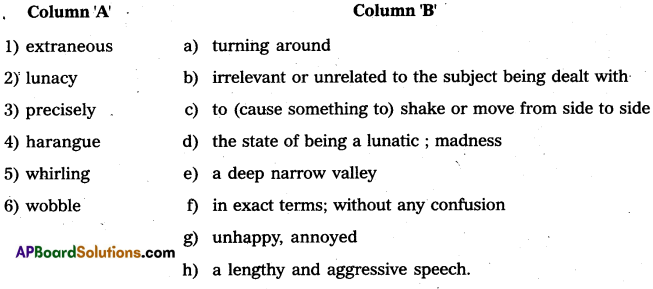
Answer:
1) b
2) d
3) f
4) h
5) a
6) c

XVII. Read the following bar chart and interpret it in a paragraph. (1 × 5 = 5)
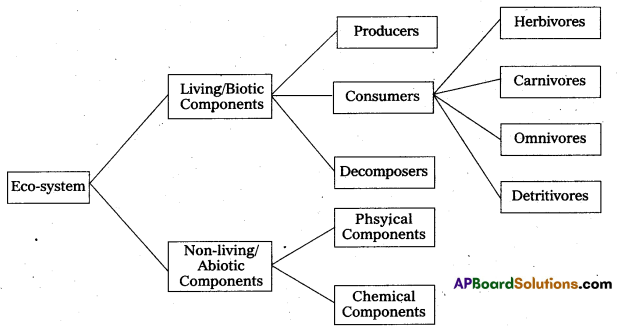
Answer:
Eco-system can be divided into two parts
- Living Biotic components and
- Non- living abiotic components.
In the living components there are three divisions Producers, Consumers and Decomposers. In Non-Living again there are two types of components Physical components and Chemical componants. In the consumers we have the Herbivores, Carnivores, Omnivores and Detritivores.
OR
Draw a pie chart with the information given in the table.
Expenditure statement.

Answer:

XVIII.Read the following transcriptions and write ANY FIVE words in ordinary spellings. (5 × 1 = 5)
a. /æmpjuteIt/
Answer:
amputate
b. /kærǝktǝ(r)/
Answer:
caretaker
c. /p3:pes/
Answer:
purpose
d. /ǝkleim/
Answer:
acclaim
e. /kǝnsi:v/
Answer:
concieve
f. /fiǝ(r)/
Answer:
fear
g. /nælidz/
Answer:
knowledge
h. /neibǝ(r)/
Answer:
neighbour
i. /fa:ðǝ(r)/
Answer:
father
j. \(/ \mathrm{bl \Lambda d} /\)
Answer:
blood
OR
Find the word that is different from the other words in the group with regard to the sound of the underlined letters.
a. silk ship sugar
Answer:
silk
b. ice ink idiot
Answer:
ice
c. food look book
Answer:
food
d. crop crone drop
Answer:
crone
e. god great gentle
Answer:
gentle
XIX. Write the number of syllables for ANY SIX of the following words : (6 × 1⁄2 = 3)
a. shame
Answer:
Monosyllabic
(1 syllable)
b. sort
Answer:
Monosyllabic
(1 syllable)
c. security
Answer:
Polysyllabic
(4 syllables)
d. lunacy
Answer:
Trisyllabic
(3 syllables)
e. navigational
Answer:
Polysyllabic
(5 syllables)
f. resplendent
Answer:
Trisyllabic
(3 syllables)
g. answer
Answer:
Disyllabic
(2 syllables)
h. truth
Answer:
Monosyllabic
(1 syllable)
i. soldier
Answer:
Disyllabic
(2 syllables)
j. weather
Answer:
Disyllabic
(2 syllables)
XX. Complete the following dialogue : (4 × 1 = 4)
Arun: Hi look ! There are many people over there ! What ……… ?!
Babu: Oh, it seems to be an ……… ! Let’s come closer!
Arun: O my God! It’s really terrible accidnt. The man is bleeding.
Babu: I bet there was a nose-to-tail accident, because front car was seriously damaged and the other car was completely damaged at the back.
Arun : I think so. Let’s give them ……………
Babu: We must take them to the nearest ………. right away. Can you call the ambulance for help while Tm handling this man?
Arun: Okay.
Babu : Okay. You should call the police officer too.
Answer:
Arun : Hi look! There are many people over there! What ……..? !
Babu: Oh, it seems to be an ………. ! Let’s come closer!
Arun : O my God! It’s really terrible accident. The man is bleeding.
Babu : I bet there was a nose-to-tail accident, because front car was seriously damaged and the other car was completely damaged at the back.
Arun : I think so. Let’s give them ……….
Babu : We must take them to the nearest …….. right away. Can you call the ambulance for help while I’m handling this man?
Arun : Okay.
Babu : Okay. You should call the police officer too.
